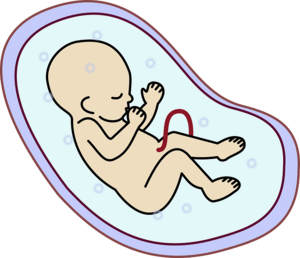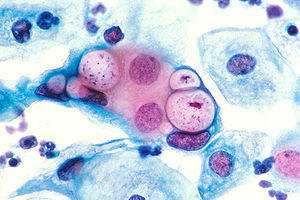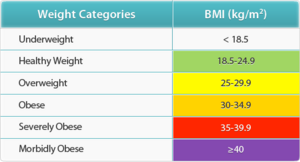Miscarriage
A normal pregnancy lasts for 40 weeks and ends in childbirth, however when the pregnancy is abruptly ended before 20 weeks it is known as a miscarriage. Miscarriage, also known as spontaneous abortion or pregnancy loss, is the death of an embryo or fetus before it is able to sustain independently. The cutoff of 20 weeks of gestation is used, until the fetal death is known as a stillbirth. The likelihood of a miscarriage decreases after this term, but if it happens they are also known as late miscarriages.[1]Over 80% of miscarriages occur within the first three months of pregnancy. There are studies that reveal that about 10% to 25% of clinical pregnancies end up in miscarriages, whereas, almost 50% to 75% of miscarriages are women experiencing chemical pregnancies. When a woman has her period soon after implantation, she loses the pregnancy altogether, with most woman not recognizing she was pregnant as the child is lost early. Cite error: Invalid <ref> tag; invalid names, e.g. too many Fetal loss can happen at any stage in a pregnancy. The results of a miscarriage are very devastating to parents emotionally. There are also many types of miscarriages, including sporadic miscarriage, recurrent miscarriage, blighted ovum, complete miscarriage, ectopic miscarriage, incomplete miscarriage, missed miscarriage, and threatened miscarriage. There are many risk factors and causes of miscarriages including chromosomal abnormalities, unhealthy lifestyle of the mother, maternal age, trauma, untreated thyroid disease, diabetes, infections, alcohol, tobacco and other teratogens that may affect the development of the fetus and embryo.
Types of Miscarriages
Miscarriage is a broad umbrella term to explain the loss of a growing fetus. However, there are different types depending on the causes and stage of the pregnancy. This does not happen in an instant; rather it is a process that occurs in the body over a short period of time. They also have different stages that they go through before the child is completely removed, or gone.
Sporadic Miscarriage
The most common complication of early pregnancy. They are considered to primarily represent failure of abnormal embryos to progress to viability. [2] Fifty-percent of sporadic miscarriages are due to chromosomal abnormalities which aren't compatible with normal development. A genetic glitch occurs during the process of fertilization, causing growth difficulties for the embryo.
Recurrent Miscarriage
A disease distinct from infertility, it happens when a women experiences two or more failed pregnancies. Recurrent miscarriage is thought to have multiple etiologies, including parental chromosomal anomalies, maternal thrombophilic disorders, immune dysfunction and various endocrine disturbances. [2] Women usually have no problem getting pregnant, but the problem is they keep on miscarrying despite a healthy pregnancy process. Women with recurrent pregnancy loss may be evaluated for blood-clotting problems, hormone imbalances, thyroid disorders, autoimmune disease, scarring or fibroids in the uterus. [3].
Blighted Ovum
A blighted ovum is also known as an anembryonic pregnancy. This occurs when the fertilized egg is implanted in the uterus but does not develop into an embryo. Blighted ovum usually occurs early in a pregnancy, when women themselves are not aware of being pregnant.
Complete Miscarriage
A complete miscarriage is when the embryo and all the products of conception is emptied out of the uterus. There should be no signs of pain or cramping and bleeding would subside quickly.
Ectopic Miscarriage
An ectopic miscarriage happens when a fertilized egg implants outside of the uterus. Ectopic miscarriages also known as Ectopic pregnancy may also occur in the ovary, abdomen, cervix or fallopian tube. The fertilized egg will not survive outside of the uterus therefore a miscarriage is bound to happen.
Molar Miscarriage
A molar miscarriage occurs when there is a genetic error during the process of fertilization this then leads to tissue that is abnormal being grown in the uterus. The female mostly has common symptoms of pregnancy as she will skip her period, test positive to a pregnancy test, and have nausea, but the pregnancy rarely involves the embryo of the child developing.
Incomplete Miscarriage
An incomplete miscarriage is when tissues and products related to pregnancy is not entirely cleared out of the uterus. There is bleeding from the uterus, and it is with an open cervix. The bleeding is mostly caused by the cervix dilating which caused the membranes in the women's body to rupture. The female usually has pain in the abdomen or back, and bleeding will not stop if the miscarriage is not complete. This results in the female requiring medical attention and treatment.
Missed Miscarriage
Missed miscarriage is also known as missed abortion, or silent miscarriage. The women’s body does not recognize that the fetus had died, and the women’s body may continue to release hormones that shows signs and experiences of pregnancy. The fetus dies but it remains in the uterus. Usually this type of miscarriage can only be confirmed by an ultrasound scan.[4]
Threatened Miscarriage
Threatened miscarriage is when a pregnant women experiences bleeding but the pregnancy continues. In severe cases, a threatened miscarriage could progress to a miscarriage. The women may experience pain in the lower back, as well as have cramps. THe bleeding that the women has is usually caused my the implantation of the zygote, and the bleeding continues as the cervix in the women's vagina is closed.
Symptoms of Miscarriages
The symptoms of a miscarriage vary depending on the stage of pregnancy. Also, it is not always easy to tell whether a miscarriage is taking place. It often does not occur as a single event but as a chain of events over several days. One woman's physical experience and personal symptoms of a miscarriage can be very different from another woman's experience. Some warning signs of miscarriage include:
Bleeding
Bleeding from the vagina is often a warning sign, but not all bleeding predicts that a miscarriage will occur. Bleeding occurs at some point in a majority of pregnancies, but if it occurs within the first 12 weeks, it may be a sign of miscarriage. If the bleeding is light and doesn't last for a long duration, then chances are it is not associated with miscarriage. Miscarriage has a higher chance of occurring if the bleeding progresses from light to heavy with a bright red colour.
Cramping
Cramps or contractions in the lower back or abdomen may also be a sign of miscarriage, especially if they become progressively stronger by time. If in fact when miscarrying, bleeding comes extremely heavy and cramping becomes extremely painful because the cervix dilates. [5]
Pains
Abdominal pain, constant or intermittent, may begin after bleeding occurs. If a women has both bleeding and persistent pain, the chances of the pregnancy may lower. Hence, it is important to take these signs into consideration. It is often overlooked, but back pain of a greater intensity than usual can also be a sign. Especially when bank pain beings in the lower abdomen and pelvic area and gradually migrates to the lower back.
Cessation of Nausea
A dramatic decrease in nausea could indicate a problem in pregnancy. When women gradually feels that their body is changing, it may be a sign of a decrease in signs of pregnancy. If you are in a stage which nausea should occur, then you should visit your doctor.
Causes of Miscarriages
Occupational Risks
Pregnant mothers in the workforce that are exposed to certain teratogens and chemicals are at higher risk of experiencing a miscarriage. The teratogens and chemicals being inhaled can be detrimental to the fetus.
Chromosomal Abnormalities
During the first trimester of pregnancy chromosomal abnormality is the most common cause of miscarriage. Chromosomal abnormality means that the baby or fetus has abnormal chromosomes, most abnormality happens because of damaged egg or sperm cells, problems that arose during cell division, and environmental factors including teratogens. 10-15% of all pregnancies end in miscarriage and around 60% of those miscarriages show a chromosomal abnormality. Discovering an abnormal karyotype allows the parents to avoid unnecessary testing and treatment. The following abnormalities are part of the cytogenic anomalies it includes, autosomal trisomies (27%), polyploidies (10%), chromosome X monosomy (9%) and structural rearrangements (2%).
Uterine Abnormalities
Antiphospholipid antibodies (APA) found in women are also more at risk for experiencing a miscarriage. According to a study done by Clifford et al. 14% of the women they tested (previously experienced miscarriage) had a proven prevalence of APA, and of the women that were tested positive with APA, 67% had experienced early pregnancy losses. The fetal loss rate in women with APA is as high as 80%.
Abnormal uterine bleeding accompanied by lower back pains and cramping may be associated with miscarriages.
Bacterial Infections
Bacterial Vaginosis-a condition where the balance of bacteria in the vagina is in a state of imbalance leading to an overgrowth of bacteria that overpowers the usual beneficial bacteria. This infection is believed to be linked to miscarriages.
Chlamydia -Increases miscarriage risk, evidence that bacteria can alter immune response against an early pregnancy.
Listeria - risk in unpasteurized cheese and deli meats linked to miscarraiges
Salmonella -common in poultry, red meat and uncooked eggs, increases risk of miscarriages
Toxoplasmosis - Cats carry a bacteria called Toxoplasma gondii, these bacteria cause toxoplasmosis which can cause miscarriage or congenital problems in a fetus.
Parvovirus B19 (Fifth Disease) If a pregnant mother is exposed to this virus during pregnancy, 5% end up miscarrying.
Rubella (German Measles)- Rubella can cause birth defects as well as miscarriages, however it is not common because of vaccination against the virus.
Untreated Illness of the mother
Müllerian anomalies- women with müllerian anomalies are predisposed to recurrent pregnancy loss because of inadequate vascularity to developing embryo and placenta, reduced intraluminal volume or cervical incompetence. Women with müllerian anomalies have a difficult time conceiving especially with women who has uterine septum, biocornuate uterus, and intrauterine adhesions.
Hypothyroidism, disorder in which the thyroid gland does not produce enough thyroid hormone, increases the risk of a miscarriage. Even before conception, thyroid conditions that have lingered untreated can hinder a woman's ability to become pregnant and can lead to possible miscarriage [6]. Without enough thyroid hormones, people experience tiredness, dry skin, hair loss and potential weight gain as well. Babies actually get thyroid hormones from their mothers, it is not until later on that the baby develops its own hormones. Thyroid hormones are very important during pregnancy because they are crucial for brain development. Mothers also need sufficient thyroid hormones in order to support a growing fetus, which is also why a lack of these hormones could cause a miscarriage.
Diabetes A four-fold increase in the risk of spontaneous miscarriage was reported in diabetic pregnant women with poor glycaemic control in early pregnancy (Temple et al., 2002)[7]
High Blood Pressure or Hypertension is when blood exerts an above-average amount of pressure that's released against blood vessel walls. It is defined by having a blood pressure greater than 140/90 mm Hg [8]. It is possible for women to experience "Pregnancy-Induced Hypertension" (PIH) or Gestational Hypertension is when your blood pressure is higher than 140/90 measured on two separate occasions, more than 6 hours apart, without the presence of protein in the urine and diagnosed after 20 weeks of gestation [9]. Conditions for PIH usually disappear after fetus delivery. It is highly recommend for pregnant women to attend prenatal doctor appointments to ensure a healthy pregnancy despite having hypertension.
Risk Factors
Maternal Age
Maternal age is the biggest risk factor for spontaneous miscarriage. A pregnant woman’s age is related to miscarriages and the outcome of the pregnancy. Pregnant woman at age 15 or younger who gives birth to a baby, the baby is three or four times more likely to die before their first birthday than those who are born to mothers who are between 23-29. (Phipps, Blume & Demonner, 2002). Increasing age of mothers is also related to miscarriages and infertility. The older a women is, the greater the chances that her eggs may contain an abnormal number of chromosomes, making older mothers are at risk for many problems.
Multiple Pregnancies
Any pregnancies involving twins, triplets, quads or more are considered at risk compared to only one fetus. Risk is highly positively correlated with the number of fetuses during a pregnancy.
Alcohol Consumption
Alcohol is currently the most common human teratogen. In Canada, 5-8% of woman report drinking during their pregnancies (Public Health Agency of Canada, 2008). Mother drinking in the first 10 weeks of pregnancy is at an increase risk of a miscarriage. When a pregnant woman drinks, the alcohol in her blood crosses the placenta into the fetus’s bloodstream and amniotic fluid. Women who drink during their pregnancy are also at higher risks of giving birth to children that will develop fetal alcohol syndrome (FAS).
Tobacco and Smoking
Smoking during the first trimester of pregnancy increases the risk of miscarriage. When a mother smokes she herself gets less oxygen and so the fetus also gets less oxygen. When a mother smokes, the fetus also makes less breathing movements and the fetus also metabolizes some of the cancer-causing agents contained in tobacco. Furthermore, smoking may be linked to the increased risk of miscarriages and sudden infant death syndrome.
Drugs
In Canada, 1% of women report using illegal drugs even when they are aware that they are pregnant. Using illegal drugs may lead to placental abruption which causes severe bleeding and is life threatening to both the mother and the baby. Drugs can severely jeopardize both the health of the mother and the baby.
Smoking marijuana or Cannabis restricts the baby from receiving the proper amount of oxygen needed to healthily grow.
Cocaine will enter both the mother and the baby's circulation system. However, the elimination of the drug is much slower in the fetus than it an adult [10]. In other words, the drug remains in the baby's system for an extended period of time than the mother. Not only does cocaine exposure increase the risk of miscarriage, but later on in pregnancy it can also lead to bleeding, preterm birth and fetal death.
Heroin is a more dangerous drug than the two mentioned above due to its extent of addiction. An addicted mother can give birth to a naturally born addicted child. Hence, the cycle will just keep on repeating.
Obesity
Obesity is determined by a calculation of height and weight, called body mass index (BMI). An increasing BMI lessens the chance of fertility and the risk of roetal malformation increase. Women who are obese have a 67% greater chance for miscarriage than women who are normal weight, according to a study conducted at London's St. Mary's Hospital [10]. It is recommended that women should go for counselling before pregnancy so they can improve health for themselves and for their future baby. It is not recommended for pregnant women to diet once she becomes pregnant, instead they can seek advice from a medical professional or a nutritional counselor.
Caffeine
There is no credible data that a cup of a coffee, caffeinated soda, or tea increase the risk of miscarriage. Many studies tried to discover a link between caffeine consumption and miscarriage. A study by the Kaiser Permanente Division of Research showed that women who consumed 200 mg or more of caffeine per day had twice the miscarriage risk as women who consumed no caffeine at all. [11]. This amount is equivalent to approximately 2 or more cups of regular coffee of 5 twelve ounce cans of caffeinated soda drink. Women who consumed less than 200 mg of caffeine daily had more than 40% increased risk of miscarriage as well. Factors in the study included: type of caffeinated drinks, timing, frequency and the amount of intake.
It is recommended that pregnant women should lower or even restrict caffeine consumption during pregnancy. When caffeine is consumed, it crosses the placenta to the fetus, but it may be hard for the fetus to metabolize the caffeine due to their under-developed body system[11]. Decaffeinated coffee or tea is a great substitution.
Misconceptions of Frequency
A national assessment was made of the general US population regarding the causes of miscarriage. This entailed 1083 respondents from 48 states completing an online questionnaire that assessed their knowledge and perceptions of the specific topic. The researchers found that many believed that miscarriages were far less common than it is, with over half the respondents believing that miscarriages occurred in fewer than 6% of pregnancies. The reality of the situation is that according to the American College of Obstetricians and Gynaecologists (ACOG), 10-25% of all clinically recognized pregnancies will end in miscarriage. Since many believe the loss of pregnancy is more rare than it is in actuality, the patients may come to believe more isolated and alienated from other mothers.
Rates of Miscarriage
Women range in the rates of miscarriage, but most healthy women range from about 10% to 25% averaging at about 15%-20% of women losing their child. The rates vary according to the age of the women; as women gets older, there are more risks associated with her pregnancy and miscarriage is more prone. Whereas when women are younger, the chances of miscarriage are prevalent but much slimmer. When under the age of 35 years old, the women have about a 15% risk of having a miscarriage. Women between the ages of 35 to 45 the chances increase to about 20% to 35% of losing the pregnancy. And finally, women that are over the age of being 45 have the greatest risk at a 50% chance of having a miscarriage. There is a drastic increase in the percentage for women that are over the age of 45 compared to a women who is maybe about 40. Subsequently, those women that have previously had a miscarriage, no matter their age, have a slightly higher risk at about a 25% of a miscarriage.Cite error: Invalid <ref> tag; invalid names, e.g. too many
Misconceptions of Causes
Old Wives' Tales about Miscarriage
Two common tales about miscarriage is one being that a women can have a miscarriage if she has sex while she is pregnant or stressed. There is no evidence to support this. Although doctors do suggest, having sex while pregnant could promote a healthier child, but it is not necessary. The other tale, is that exercising is not good or healthy while pregnant. This is not true, although a woman should not take up a high-impact sport that could cause falling or being pummelled, it is healthy to exercise gently and softly during pregnancy while not pushing yourself too hard. Cite error: Invalid <ref> tag; invalid names, e.g. too many
Public Perception
The causes of miscarriage are not well understood as there may be various underlying causes and often each case is not identified. Despite the prevalence of miscarriage, little is known regarding the rate, cause and the public’s perception of pregnancy loss. Myths, folklore and harsh stigma surrounds miscarriage with the reluctance of those who experience miscarriage to open up about their experience. Resultantly, this leads to a significant knowledge gap between the medical diagnoses of a miscarriage and a patient’s personal experience. Lack of full understanding of cases by cases causes leads to false perceptions of these lived experiences. Insight into the public perception can help ensure that comprehensive care and education are provided.
Most miscarriages that occur in the first trimester of pregnancy are caused by chromosomal abnormalities in the baby, which leads to damaged egg or sperm cells. Surprisingly, most chromosomal problems occur by chance and are not related to the mother's or father's health. The majority of respondents believed that miscarriage could be caused by these reasons.
76% - A stressful event
74% - Longstanding stress
64% - Lifting a heavy object
41% - Sexually transmitted disease
31% - Previous abortion
28% - Use of implanted long-term birth control
23% - Mother not wanting to be pregnant
During this study, of those who had had a miscarriage, 40% felt that they had done something wrong to cause the miscarriage; 27% felt ashamed; 40% felt alone; and 47% felt guilty. This viewpoint that puts more blame on the women contributes to many patients feeling increasingly isolated and guilty. Whereas most believe that stress is the most common cause of miscarriage, there is no proof that stress is a cause at all.
"More open discussion of miscarriage and disclosures by celebrities and public figures would likely help in educating the public and ameliorate the secrecy and shame. Identifying a cause of miscarriage, even if no intervention is available, can be quite beneficial,” said S. Zev Williams, MD, PhD, a coauthor of the study, in an Albert Einstein College of Medicine press release.
Coping with Miscarriage
Psychologically
This topic isn't a comfortable topic for miscarried women and their partners. Often miscarried women make themselves feel guilty for losing their baby, however, miscarriage is not under our control. The grieving process could include denial, guilt, anger, envy and yearning. Women should not punish themselves for this heartbreaking and traumatic incident. It is perfectly fine to cry, grieve, and feel depression and anger, but it is not fine to exert an extreme amount of pressure on yourself. Different people respond differently, so there is no one correct method to cope with miscarriage. Your partner, friends and family can be your greatest support system during this low time of your lifetime. Sharing your feelings and experiences with peers is an effective way to cope. At other times, you may feel the sympathy of others is too overwhelming to handle.
If you believe your social circle is not quite as supportive as you like, a professional psychologist or women support groups. When you feel comfortable to elaborate on this topic, it may be eyeopening to discover how many peers have also undergone the same process.
Physically
If miscarried women feel physically unwell after the miscarriage, doctor and nurses are always there to offer support. A follow-up appointment are important to ensure women to get back on the right track. This is the perfect time to inform your doctor about any worries or concerns about your body, and even about future pregnancies. The sudden shift in hormones can affect brain chemistry, including postpartum depression, anxiety and mood disorders[12]. Doctors recommend giving your body one or two menstrual periods after the miscarriage before trying to get pregnant again as this helps rebuild strength and natural body processes.
It is common to experience exhaustion and upset stomach. However, it is important to still eat healthy while maintaining a healthy weight. Light exercise is also an option as exercising releases hormones called Endorphins, which can trigger positive feelings in the body. Frequent exercise can help cope with miscarriage as it reduces stress, boosts self-esteem, improve sleep, and wards off feelings of anxiety and depression. [13].
Support
Pregnancy and Infant Loss Remembrance Day was created to provide support, education and awareness for those who are suffering or know someone who has suffered a miscarriage. This day is still in the midst of being internationally legislated. Many non-English speaking countries do not legislate this day.[14]
Animals
Not only does miscarriage occur in humans, but also in animals. When dogs experience a miscarriage, we notice abnormal vaginal bleeding. The common cause of a spontaneous abortion is due to a hormonal imbalance, like women [15]. Because pets cannot communicate their symptoms out verbally, it is important for their owner to carefully observe their behaviour. If they act abnormally, then you should contact a veterinarian. The veterinarian can perform an ultrasound on your pet in order to detect a viable pregnancy of any sort. A dog's uterus will occasionally be unable to expel all pregnancy matter effectively on its own, leading to infection or internal hemorrhaging. [15]
Causes
Brucella canis or B. canis - A type of bacteria that is widespread and easily transmittable among dogs, which may cause miscarriage and stillbirth. Symptoms include a prolonged vaginal discharge, arthritis and inflammation of the eye.
Mycotic Abortion - A type of fungus that cause excessive bleeding in the uterus and can lead to an aborted fetus. [15]
Neospora caninum or N. caninum - A type of parasite, transmitted through the ingestion of contaminated water, food, feces or infected animal flesh, are typically found in dogs.[15]
Artwork Inspired By Miscarriages
References
- ↑ "Miscarriage Causes, Symptoms, Rates, and More." WebMD. http://www.webmd.com/baby/guide/pregnancy-miscarriage.
- ↑ 2.0 2.1 Larsen et al. BMC Medicine 2013, 11:154 http://www.biomedcentral.com/1741-7015/11/154.
- ↑ "Miscarriage: Signs, Symptoms & Causes." LiveScience. TechMedia Network, 4 Feb. 2015. http://www.livescience.com/44663-miscarriage.html
- ↑ Knott, Laurence. "Miscarriage. Signs, Symptoms and Causes." Patient. 13 Nov. 2013. http://patient.info/health/miscarriage-and-bleeding-in-early-pregnancy
- ↑ "Miscarriage in the First Trimester." Our Bodies Ourselves. 9 Apr. 2014. http://www.ourbodiesourselves.org/health-info/miscarriage-in-the-first-trimester/
- ↑ "The Thyroid and Pregnancy." Thyroid Awareness. http://www.thyroidawareness.com/the-thyroid-and-pregnancy.
- ↑ Hum. Reprod. (2004) 19 (7): 1644-1646. doi: 10.1093/humrep/deh277
- ↑ "40". Williams obstetrics (24th ed.). McGraw-Hill Professional. 2014. ISBN 9780071798938.
- ↑ Lo, JO; Mission, JF; Caughey, AB (April 2013). "Hypertensive disease of pregnancy and maternal mortality.". Current opinion in obstetrics & gynecology 25 (2): 124–32. PMID 23403779.
- ↑ 10.0 10.1 "Does Obesity Increase Risk of Miscarriage?" Health Central. 30 Aug. 2012. http://www.healthcentral.com/obesity/c/276918/155638/risk-miscarriage/.
- ↑ 11.0 11.1 Kaiser Permanente Division of Research. "Caffeine is linked to miscarriage risk, new study shows." ScienceDaily. 22 January 2008. www.sciencedaily.com/releases/2008/01/080121080402.htm
- ↑ Kripke, Kate. "13 Things To Know About Grief After Miscarriage or Loss." Postpartum Progress. 16 May 2013. Web. http://www.postpartumprogress.com/13-things-you-should-know-about-grief-after-miscarriage-or-baby-loss
- ↑ "Exercise and Depression: Endorphins, Reducing Stress, and More." WebMD. Web. http://www.webmd.com/depression/guide/exercise-depression
- ↑ "The Official Site of Pregnancy and Infant Loss Remembrance Day." Remembering Our Babies. http://www.october15th.com
- ↑ 15.0 15.1 15.2 15.3 "Miscarriage in Dogs." Pet MD. Web. http://www.petmd.com/dog/conditions/reproductive/c_dg_spontaneous_abortion_pregnancy_loss.
- Katy Clifford, Raj Rai, Hazel Watson, and Lesley Regan Pregnancy: An informative protocol for the investigation of recurrent miscarriage: preliminary experience of 500 consecutive cases http://humrep.oxfordjournals.org/content/9/7/1328
- http://miscarriage.about.com/od/infections/tp/infections.htm
- http://www.healthline.com/health/miscarriage#Symptoms4
- Epidemiology and the medical causes of miscarriage
- Recurrent miscarriage: causes, evaluation and management Carmen Garrido-Gimenez, Jaume Alijotas-Reig Postgrad Med J 2015;91:1073 151-162 Published Online First: 13 February 2015 doi:10.1136/postgradmedj-2014-132672 http://pmj.bmj.com/content/91/1073/151
- http://www.babycenter.ca/a252/understanding-miscarriage
- http://americanpregnancy.org/pregnancy-complications/miscarriage/
- http://www.healthline.com/health/miscarriage#Overview1
- Lloyd Jones, Sarah. "The Psychological Miscarriage: An Exploration of Women's Experience of Miscarriage in the Light of Winnicott's 'Primary Maternal Preoccupation', The Process of Grief According to Bowlby and Parkes, and Klein's Theory of Mourning." British Journal of Psychotherapy 31.4 (2015): 433-47. Web.
- Olmstead, Susan C. "Causes of Miscarriage Commonly Misunderstood." Contemporary Ob/gyn 58.11 (2013): 22-23. Web.







